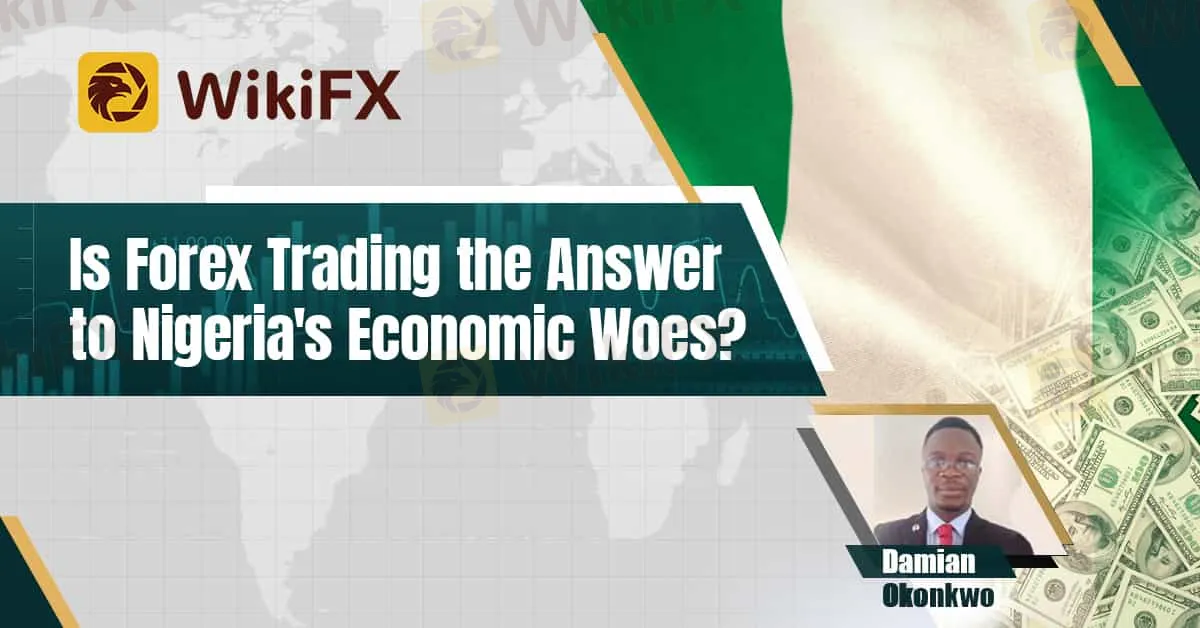简体中文
繁體中文
English
Pусский
日本語
ภาษาไทย
Tiếng Việt
Bahasa Indonesia
Español
हिन्दी
Filippiiniläinen
Français
Deutsch
Português
Türkçe
한국어
العربية
Is Forex Trading the Answer to Nigeria's Economic Woes?
Abstract:Forex trading can be a profitable avenue for a select few, but it's not a solution for Nigeria's economic woes.

By: Damian Okonkwo

Introduction
Nigeria is currently beset with a complex economic challenge arising from the scarcity of foreign exchange (forex) due to its reliance on oil exports. This has so much weakened the Naira, hindering imports, and fueling inflations. The current situation has pushed many into forex trading as the way out of the current economic woes.
Forex Trading: A Double-Edged Sword
Forex trading involves speculating on currency movements. While successful trades can generate profits, it remains a risky venture as one could lose all his investments due to extreme market volatility. The market is highly volatile, and beginners often lose money.
Deeper Problems, Not Quick Fixes
Nigeria's forex woes stem from a lack of economic diversification. The country's overdependence on oil makes Nigeria so vulnerable to oil price swings. Thus, forex trading cannot ultimately serve as the way out of the situation. Here's why:
● Limited Impact: Individual forex traders have minimal influence on the broader market.
● Win-loss Game: One trader's gain is another's loss. Therefore, while some are gaining, others are losing.
Additionally, forex trading doesn't generate new foreign currency and does not curb inflation.
Sustainable Solutions Needed
Nigeria needs long-term solutions to address forex scarcity. The ultimate solution to demands:
● Economic Diversification: Promoting exports from agriculture, manufacturing, and tech sectors will bring in more foreign currency.
● Attracting Foreign Investment: Creating a stable and attractive business environment will encourage foreign companies to invest, bringing in capital.
● Boosting Non-Oil Exports: Policies that incentivize and support the export of non-oil goods will generate more forex.
The Way Forward
Forex trading can be a profitable avenue for a select few, but it's not a solution for Nigeria's economic woes. The focus should be on long-term strategies that diversify the economy, attract foreign investment, and increase non-oil exports.

Disclaimer:
The views in this article only represent the author's personal views, and do not constitute investment advice on this platform. This platform does not guarantee the accuracy, completeness and timeliness of the information in the article, and will not be liable for any loss caused by the use of or reliance on the information in the article.
Read more

TradingView Brings Live Market Charts to Telegram Users with New Mini App
TradingView has launched a mini app on Telegram, making it easier for users to track market trends, check price movements, and share charts.

USD/INR, USD/PHP Forecast April 2025
The global forex markets are bracing for April 2025 with divergent forecasts for key emerging market pairs. In particular, the USD/INR and USD/PHP pairs have attracted significant attention amid a mix of central bank interventions, evolving U.S. policy signals, and regional economic shifts. In this article, we review multiple forecasts, examine the driving factors, and outline what traders might expect as the month unfolds.

April Forex Trends: EUR/USD, GBP/USD, USD/JPY, AUD/USD, USD/CAD Insights
Know April’s forex seasonality trends for EUR/USD, GBP/USD, USD/JPY, AUD/USD, and USD/CAD. Historical insights and key levels to watch in 2025.

Should You Beware of Forex Trading Gurus?
Know the reality behind forex trading gurus, examining their deceptive tactics, inflated promises, and the risks associated with trusting them for financial advice.
WikiFX Broker
Latest News
The Withdrawal Trap: How Scam Brokers Lure Victims into Paying More
FCA to Investors: Think Twice Before Trusting These Brokers
Trump\s tariffs: How could they affect the UK and your money
Trump gambles it all on global tariffs he\s wanted for decades
TradingView Brings Live Market Charts to Telegram Users with New Mini App
Trump tariffs: How will India navigate a world on the brink of a trade war?
IG Group Acquires Freetrade for £160M to Expand UK Investment Market
U.S. March ISM Manufacturing PMI Released
Should You Beware of Forex Trading Gurus?
Exposed by SC: The Latest Investment Scams Targeting Malaysian Investors
Currency Calculator







